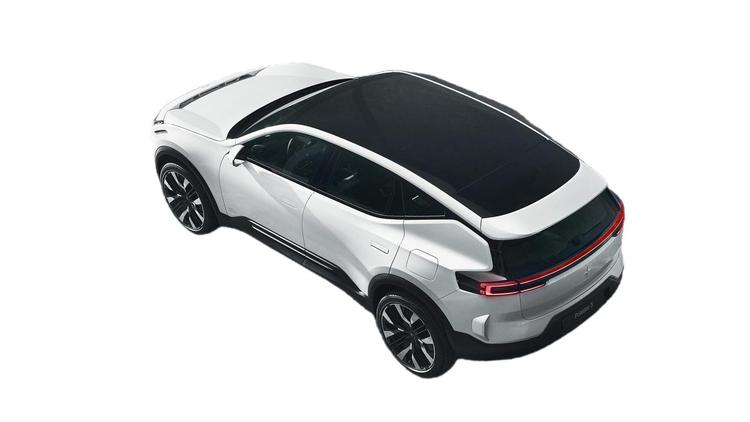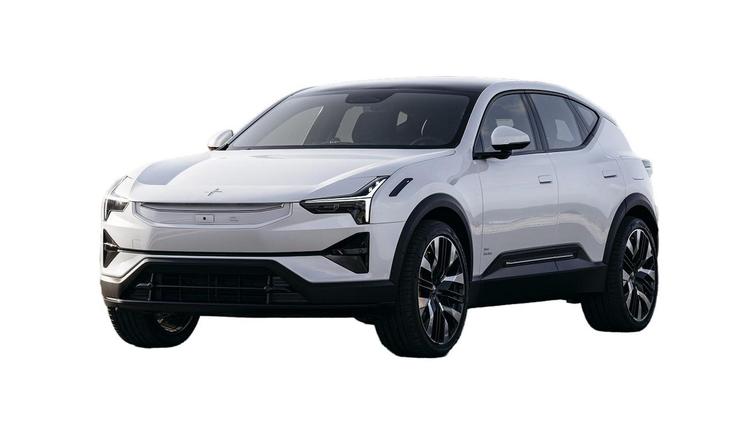The Polestar 3 takes its brand confidently into the luxury SUV segment. Jonathan Crouch takes a look.
Polestar is evolving. And proof of that comes with the Polestar 3. It's a large SUV, the company's first, and of course is fully electric, with a sporty vibe that pitches it directly against rivals like BMW's iX and Jaguar's I-PACE. The brand sees it as 'the luxury SUV for the electric age'. Maybe so.
It's been astonishing just how quickly the Polestar brand has grown, effectively on the back of just one model, the Polestar 2. Particularly as that car wasn't even (overtly anyway) part of the SUV genre that's most quickly driving sales in the market at present. The Polestar 3 very much is, this high-end large luxury EV evolving the company's design identity and, according to the marque's CEO Thomas Ingenlath, here to bring the 'sport' back to this class of SUV.
It sits on much more substantial underpinnings than the Polestar 2, using a freshly developed SPA2 platform also designed to underpin future models. And is built in China and (for Europe) at Volvo's US factory in Ridgeville, South Carolina to sell in thirty global markets.
'This is not a car to drive to the kindergarten', says Polestar CEO Thomas Ingenlath, which seems ironic since that's exactly what an awful lot of Polestar 3s will be used for. The point he's trying to make is that this should be considered amongst more engaging large crossover EVs; think more BMW iX and Jaguar I-PACE than Mercedes EQC or Audi e-tron.
The power outputs are tuned to fit with this emphasis on handling engagement. There's a dual motor AWD set-up of course and in the base 'Long Range' version, that produces 489hp and 840Nm of torque, allowing 62mph to be dispatched in 5.0s on the way to 130mph. The 'Performance' version has a 517hp output (with 910Nm of torque) and trims the sprint time to 4.7s. Both variants use the same 111kWh (107kWh usable) battery, delivering a range of 379 miles for the 'Long Range' and 348 miles for the 'Performance' model.
The 'Performance' version should feel sharper through the turns, sitting 13mm lower than the standard car, with a shorter, stiffer suspension set-up. Whatever your choice though, the brand claims the car will be 'fun to drive': Chief Engineer Joakim Rydholm asserts that 'the 3 will breathe and flow a bit more than the Polestar 2'.
This is a different kind of Polestar to anything we've seen before, though certain styling cues remain, like the Y-shaped 'Thor's Hammer' LED headlights, the full-width rear light bar and the chunky side cladding. There's a rakish silhouette with a panoramic glass roof panel that curves gently towards the back, passing beneath a prominent rear spoiler. There are air- channelling vents at the leading edge of the bonnet and substantial rear haunches, with flush-fitting door handles offering a finishing touch.
Size-wise, think BMW iX, Mercedes EQC or Audi Q8 e-tron, so it's a large category SUV. Which means that more luxury and technology is expected inside up-front, where things are dominated by a huge central screen that uses Google's latest Android Automotive OS operating system. Industry-leading connectivity features are claimed with this. That panoramic roof gives the cabin an airy feel - which isn't illusory. Unlike in the Polestar 2, there's plenty of space on the back seat, where there's a fully flat floor courtesy of the next-generation Volvo/Polestar SPA2 EV architecture. You get a decently-sized 484-litre boot too, extendable to 1,411-litres with the backrest folded.
Prices start with the 'Long Range' model at around £80,000. You'll need around £85,500 for the alternative 'Performance' version. Most customers though, as usual with EVs, will acquire ownership under leasing or PCP schemes. Visually, the two variants look much the same, though the 'Performance' is distinguished by a lower ride height and larger 22-inch wheels (up from the 21-inch rims of the 'Long Range').
We should also brief you on the manner in which you'll need to buy or lease this car, since Polestar doesn't use conventional dealerships. The closest the brand gets to this kind of thing is what it calls 'Polestar Spaces' - basically automotive department stores in shopping centres. Currently, there are only four of those - at Westfield and Battersea in London, at The Trafford shopping Centre in Manchester and at The Touchwood shopping centre in Solihull. Plus Polestar has a Test Drive Hub in Milton Keynes. And engages in short term 'pop-up' shopping spaces at malls around the country.
The primary idea though is that you should place your order online via the British section of the Polestar.com website. Then connect into the brand as and when you need to - they'll come to you when your car needs servicing, three years cover for which is included in the price.
We gave you the EV driving range figures in our 'Driving' section - 379 miles for the 'Long Range' version and 349 miles for the 'Performance' variant. Polestar says that the 111kWh battery pack (107kWh usable) has an operating voltage of around 800 volts. When plugged into an Ultra-fast charger (if you can find one), it should take around 20 minutes to charge the battery to 80%. But you'll probably be using a range of different public chargers, so Polestar has developed a multi-high-speed charging system that allows switching between 800 volt and 400 volt outputs.
Public charging of course is currently the biggest EV issue, particularly for UK customers who are getting frustrated with our nation's patchy public charging infrastructure. Polestar CEO Thomas Ingenlath says he's "impatient and annoyed" that European nations like Britain are still struggling with basics like this. "Access to electricity should be open to all", he says. "There needs to be a universal system". We wouldn't argue with that but the reality is that there isn't. And, unlike rival Tesla, Polestar doesn't have its own-brand network of charging stations to take up the slack.
Polestar has developed this and other future EVs with bi-directional vehicle-to-grid compatibility, which allows the Polestar 3 to power home appliances, electronics and even top up other EVs using the energy stored in its battery pack. The power output for bi-directional charging is set at 20kW.
Polestar says the 3 'stays true' to the brand's performance roots. It certainly stays true to the kind of formula likely to be well received in the growing sector for stylised large luxury crossover EVs. It doesn't bring anything dramatically new to the segment, but it does further refine what customers can expect from this class of car in terms of range, style, charging and connectivity.
This and the other models that share its SPA2 engineering will be key to Polestar's plans to increase sales to 290,000 units by the end of 2025. An astonishing rate of growth given that the marque shifted only 29,000 units as recently as 2021. Polestar though, is likely to continue to surprise us. Cars like this guarantee it.






